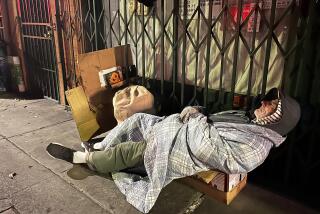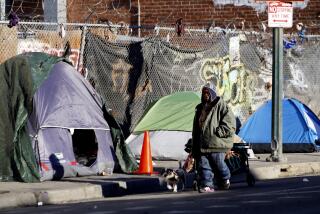County Accused of Ignoring Order on Needy Mentally Ill
Despite a court order requiring Los Angeles County to assist mentally ill homeless persons who apply for welfare benefits, only a tiny percentage of those eligible are actually receiving help, legal aid attorneys charged Thursday.
Attorneys for the city of Los Angeles joined the Legal Aid Foundation of Los Angeles and a coalition of other public interest law firms in seeking a preliminary injunction that would bar the county from denying âessential subsistence benefits to mentally disabled homeless persons.â
In a sweeping attack on the county program, the attorneys accused officials of violating a 1986 court order requiring them to help thousands of indigent, mentally ill homeless people who may be going without food and shelter because they do not know how to apply for help or who are discouraged by red tape.
âCounty Is Not Doing Thatâ
âThe county was supposed to set up a system to identify the mentally ill and developmentally disabled and to provide special help for them to apply for general relief,â said Gary Blasi, an attorney for the Legal Aid Foundation. âBut a systematic survey demonstrates that the county is not doing that.â
Rather than smoothing the way for the mentally disabled, Blasi said, the county has failed to adequately help the mentally ill obtain general relief, a last-resort, $312-a-month welfare program.
Ann Jankowski, program deputy for the general relief planning section of the Department of Public Social Services, denied Thursday that the county has violated the court order or neglected the homeless mentally ill.
âI think the program is running well,â she said. âWe have 2,500 mentally disabled persons on our caseload, and over the last six months we have had a 29% increase in cases.â
But Jankowski refused to discuss any specific allegations, noting that she and the county counselâs office have not had a chance to see the court papers, which were filed Thursday in anticipation of a hearing on the preliminary injunction scheduled April 17.
The court papers are part of class action lawsuit alleging that thousands of mentally ill residents, some of whom have attempted to apply in the past, are discouraged from seeking general relief.
Called Complex, Intimidating
Attorneys for the indigent mentally ill contend that the process of applying for such aid is so complex and intimidating to their clients that many give up trying. Sympathizing with that plight, Superior Court Judge John L. Cole ordered the county in 1986 to devise a method âto identify and assistâ the mentally ill.
The Department of Public Social Services established such a program to meet the court mandate, but Legal Aid Foundation attorneys charged Thursday that few mentally disabled persons have actually benefitted from the change.
âSubsequent discovery and investigation have now revealed, however, that these regulations exist principally on paper,â the lawyers said in their filing. âThe regulations are neither understood nor properly implemented . . . nor do DPSS officials monitor compliance with the regulations to assure that their objectives are fulfilled.â
As a result, the lawyers contend, fewer than 1% of the general relief applicants in the countyâs Skid Row office were identified as needing assistance, although two-thirds of the applicants are homeless and one-third of those are considered mentally ill.
A survey also showed that the average applicant spent more than 5 1/2 hours in the welfare office, the lawyers said, and one homeless applicant was observed waiting for eight hours for assistance, finally leaving without seeing any official.
One employee, quoted in court documents, said she worked with the mentally disabled in Venice and saw their frustration with the long waits and confusing paper work. âThey are like lost souls when it comes to negotiating the DPSS system . . . ,â she said.
More to Read
Sign up for Essential California
The most important California stories and recommendations in your inbox every morning.
You may occasionally receive promotional content from the Los Angeles Times.










